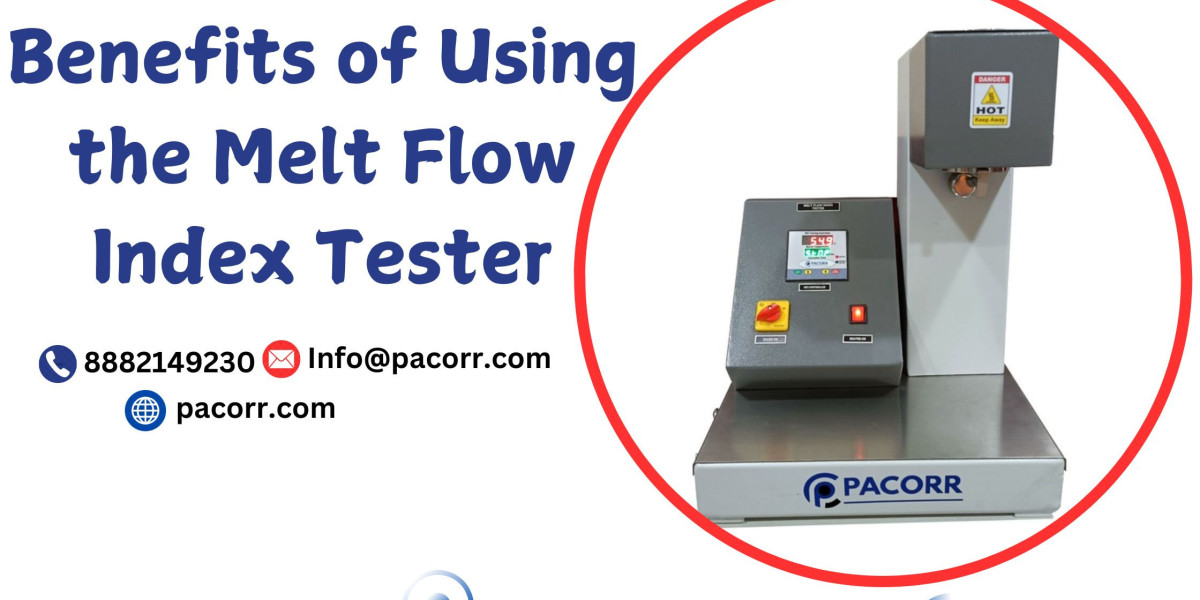When it comes to ensuring the quality and performance of polymers, the Melt Flow Index Tester (MFI) plays a crucial role. Used across industries such as plastics, packaging, and automotive manufacturing, this testing equipment measures the flow characteristics of thermoplastic materials under controlled conditions.
What is a Melt Flow Index Tester?
A Melt Flow Index Tester is a specialized instrument designed to measure the flow rate of molten thermoplastic polymers under a standardized set of conditions. This flow rate, commonly known as the Melt Flow Index (MFI), indicates how easily the polymer flows when it is subjected to heat and pressure. MFI is an essential parameter for assessing a polymer's processing behavior and suitability for various applications.
MFI helps manufacturers determine key characteristics such as the polymer’s viscosity, molecular weight, and molecular weight distribution. These factors directly impact the material’s processing, strength, and durability, making the Melt Flow Index Tester an indispensable tool in quality control.
The Importance of MFI in Manufacturing
The Melt Flow Index Testing is vital for manufacturers and researchers because it provides insight into how a polymer will behave during processing. A higher MFI value indicates that the material flows more easily, which is critical for injection molding, extrusion, and other plastic manufacturing processes. On the other hand, a lower MFI value suggests that the polymer is thicker and more viscous, making it suitable for applications requiring more strength and durability.
By accurately measuring MFI, manufacturers can make informed decisions about the processing conditions for their materials. This helps in maintaining consistency across production batches and avoiding potential issues like inconsistent material performance or product failure.
How Does the Melt Flow Index Tester Work?
The Melt Flow Index Tester operates by melting a sample of polymer at a specific temperature and then forcing it through a standardized die under a controlled weight. The time it takes for the material to pass through the die is recorded, and the Melt Flow Index is calculated based on the amount of material extruded per unit of time.
The standard conditions typically used in the test are specified by international standards such as ASTM D1238, which defines the test parameters for different polymer types. The test measures the material’s flow rate at a given temperature and pressure, providing manufacturers with a clear indication of how the polymer will behave during processing.
Why Choose Pacorr’s Melt Flow Index Tester?
At pacorr.com, we offer a high-quality Melt Flow Index Tester Price designed to provide accurate and repeatable results, ensuring that your materials meet the desired specifications. Here’s why our Melt Flow Index Tester stands out:
- Precision and Accuracy: Our testers are equipped with advanced technology to ensure highly precise measurements, giving you confidence in your polymer’s flow characteristics.
- User-Friendly Interface: With an easy-to-use interface and intuitive controls, our testers make it simple to perform tests and analyze results, saving you time and effort.
- Durability and Reliability: Built to withstand the demands of industrial use, Pacorr’s Melt Flow Index Tester is designed for long-term reliability and minimal maintenance.
- Customizable Settings: The tester offers customizable settings to accommodate different polymers and testing standards, giving you the flexibility to perform a wide range of tests.
- International Standard Compliance: Our testers comply with international standards like ASTM, ensuring your results are globally accepted and relevant for your industry.
Applications of the Melt Flow Index Tester
The Melt Flow Index Tester is used in a variety of industries where polymers are an integral part of the manufacturing process. Some of the primary applications include:
- Plastic and Polymer Manufacturing: Testing MFI helps manufacturers control the processing of plastics and ensure consistency in product quality.
- Automotive Industry: Polymers used in automotive parts need to meet specific standards for strength and durability, which can be assessed through MFI testing.
- Packaging: The packaging industry relies on MFI testing to ensure that the materials used, such as films and containers, have the necessary flow properties for effective processing.
- Research and Development: Researchers use the MFI tester to study new polymer blends and innovations in material science.
How to Use the Melt Flow Index Tester
Using the Melt Flow Teste involves several simple but critical steps:
- Prepare the Sample: A small sample of the polymer is prepared, ensuring it fits within the specified size and weight requirements.
- Set the Test Parameters: Input the desired test temperature and load weight according to the material specifications and the relevant standard (e.g., ASTM D1238).
- Run the Test: The tester will heat the polymer and force it through the die under the set load, measuring the flow rate.
- Analyze the Results: Once the test is complete, the system provides the MFI value, which is then analyzed to understand the polymer’s flow characteristics.
Conclusion
The Melt Flow Index Tester is an essential instrument for manufacturers who rely on polymer materials in their production processes. With its ability to provide accurate and reliable flow measurements, it helps ensure the consistent quality of products while optimizing manufacturing processes. At pacorr.com, we are committed to providing high-quality testing instruments like the Melt Flow Index Tester to support industries in their quality control and material development efforts.
By incorporating Pacorr’s Melt Flow Index Tester into your testing regimen, you gain the ability to fine-tune your material formulations, improve product quality, and ensure compliance with industry standards.








